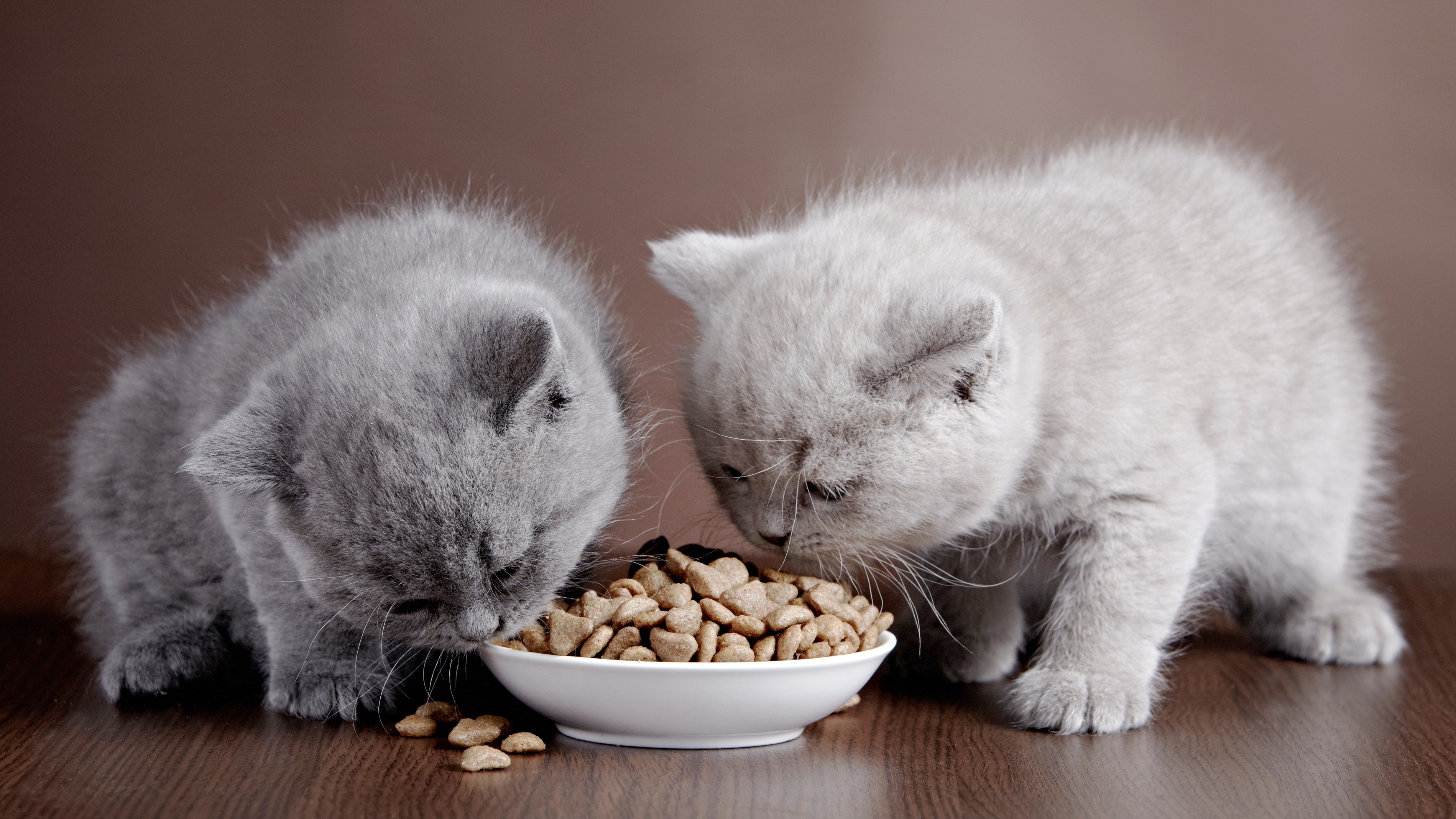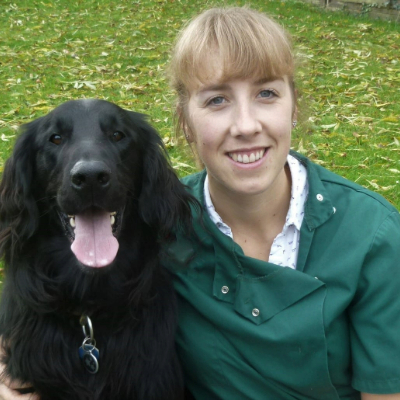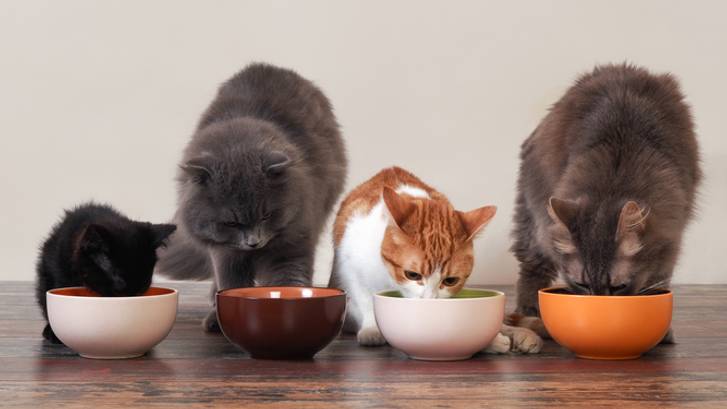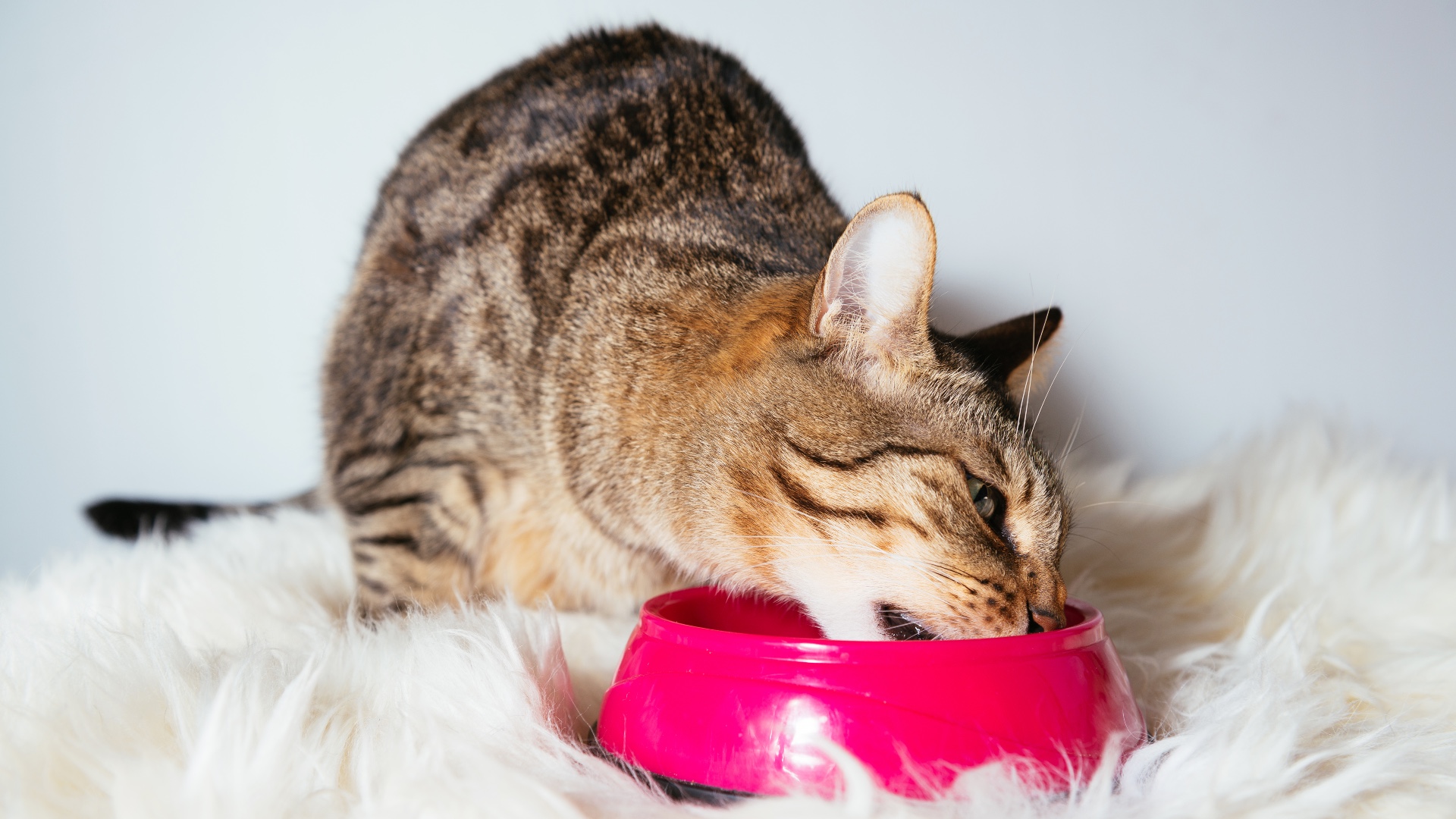Kitten food vs cat food — does it really matter which meal you dish up to your moggy?
An expert vet settles the kitten food vs cat food debate once and for all so you can rest easy knowing you’re feeding your feline friend the best possible meal.

Kitten food vs cat food — does it really matter which one you serve up to your feline friend? Well, as it turns out, it certainly does! While it can be so easy to fall into the trap of thinking cat food is cat food, kittens, adult cats and our most senior of companions, all require slightly different diets in order to thrive.
Although the best kitten food and the best dry cat food and wet food for adults look very similar, they actually have very different nutritional profiles that have been tailored to suit cats at different stages in their lives. For example, with kitten food, you’ll find the protein and fat content is much higher than in adult food to help ensure their brains and bodies have everything they need to grow and develop.
While feeding a kitten the odd portion of cat food and your adult cat the occasional portion of kitten chow is unlikely to do any harm, it’s important you don’t resort to this on a regular basis. It’s always best to stick to a formula that’s been designed to meet the specific nutritional needs of your feline friend and if you’re even in doubt, always consult your vet.
With that in mind, we spoke to Dr. Rebecca MacMillan to get her expert opinion on the key differences between kitten and cat food and when it’s safe to transition your little one over to an adult diet. Here’s what she had to say…

Dr. Rebecca MacMillan is a companion animal vet with over 13 years of experience treating and looking after pets. She graduated from the UK Royal Veterinary college in 2009, and has worked in several practices over the years. Rebecca is also an experienced writer, using her veterinary background to offer expert opinion and advice.
Kitten food vs cat food: What’s the difference?
One of the biggest differences between kitten food and adult cat food is the proportion of protein and fat that each one contains. According to VCA Animal Hospitals, the recommended dry matter protein range for healthy kitten growth is 35 to 50% while the dry matter fat content should be between 18 and 35%. For adult cats (those over the age of one) a protein content of around 30 to 35% on a dry matter basis is suggested with 20 to 24% fat.
It means kittens need up to three times more calories than adult cats to fuel their rapid growth, which the extra protein and fat provides them with.
"Kitten food has been formulated to support growth and development which means it is higher in energy and protein than adult cat food," MacMillan confirms. "Different amounts of minerals like phosphorus and calcium are also needed for kittens, compared to older cats."
Get the best advice, tips and top tech for your beloved Pets
Can you feed cat food to kittens?

A kitten’s nutritional needs are very different from their bigger brothers and sisters and they need far more nutrients and calories than adult cats do to help their bodies to grow and develop.
"It is not recommended to feed adult cat food to kittens as it will not provide everything they need for healthy growth," says MacMillan. "Kittens also expend lots of energy in play and brain development which is another reason why high energy kitten food is recommended."
Cat food also tends to be lower in DHA, an omega-3 fatty acid that supports brain and vision development in kittens and kitten food is also much higher in the vitamins and minerals needed to build a healthy immune system.
While there are some formulas on the market that say they’re suitable for all life stages, we recommend that if you’re wanting to opt for one of these (perhaps because you have both a kitten and an adult cat in your family) that you check with your vet first to ensure it has everything your little one needs.
You can also take a look at our guide to which kitten food is best to get our vet’s take on choosing the most appropriate diet for your little one.
Can you feed kitten food to cats?

The best dry cat food and the best wet cat food is geared towards one of two things: either maintaining health or providing extra support for certain health issues that a cat might be experiencing. The ratios of fat, protein, vitamins and minerals are all focused on maintenance as opposed to growth and the dish overall will be far lower in calories than kitten food to prevent obesity.
"While the odd bite of kitten food is unlikely to do any harm, it is not recommended that you give an adult cat this diet all of the time," MacMillan says. "It can lead to weight gain, with obesity making health conditions like diabetes and cancer much more likely to occur."
While many adult cats can cope with the different ratios of vitamins and minerals in kitten foods, those with underlying health complications could worsen with an inappropriate diet. You should always feed these cats on the food your vet has recommended for them.
When to switch from kitten food to cat food
Knowing how long should cats eat kitten food for can be challenging because different breeds reach maturity at different ages. Most cats are considered to be kittens until around 12 months of age, but for some bigger breeds, it can take around 18 to 24 months for them to reach adulthood.
"Kittens will usually have done most of their growth by a year of age, so this is the time you should think about transitioning them to an adult diet. The exception will be larger breeds of cat (e.g. Maine Coons) which may need to stay on a kitten diet until at least 18 months of age," explains MacMillan.
As with all important decisions surrounding your furry friend, we recommend you consult your vet who will be able to help guide you as to when to transition your kitten over to adult cat food and how to do so safely. You can also seek help if you find a kitten not eating – it’s never a good idea to switch them on to cat food too early.
Looking for more great kitty content? Check out our guide to changing cat food for advice on how to transition your feline friend safely.

Kathryn is a freelance writer who has been a member of the PetsRadar family since it launched in 2020. Highly experienced in her field, she's driven by a desire to provide pet parents with accurate, timely, and informative content that enables them to provide their fur friends with everything they need to thrive.
Kathryn works closely with vets and trainers to ensure all articles offer the most up-to-date information across a range of pet-related fields, from insights into health and behavior issues to tips on products and training.
When she’s not busy crafting the perfect sentence for her features, buying guides and news pieces, she can be found hanging out with her family (which includes one super sassy cat and a kitten), drinking copious amounts of Jasmine tea and reading all the books.
She has written for a range of publications, including Fit&Well, Top Ten Reviews, LiveScience, Goodto, and Product Hunt.
